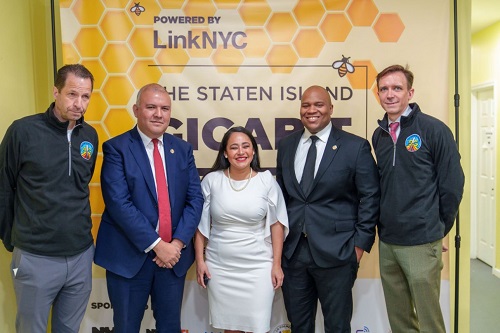LinkNYC, in collaboration with the New York City Office of Technology and Innovation (OTI), ZenFi Networks, the NYC Mayor’s Office of Immigrant Affairs (MOIA), and La Colmena, a community-based organization focused on empowering immigrants, has opened the Staten Island Gigabit Center at the La Colmena community center in Stapleton Heights.
The Staten Island Gigabit Center is a community resource that offers free high-speed internet, digital literacy training, and other services with a focus on immigrant New Yorkers, all powered by LinkNYC’s free public Wi-Fi network.
The center will provide Staten Island residents, especially those from disadvantaged backgrounds, with high-speed internet access to help bridge the digital divide. Citywide, one-in-three households lack either home or mobile broadband, and 1.3 million New Yorkers have neither — with the disparity most prevalent in low-income and minority communities.
In fact, 28 percent of immigrant households in the city completely lack internet access. On Staten Island alone, 18 percent of households do not have immediate access to reliable Wi-Fi and 12 percent of public school students do not have access to adequate broadband outside of school.
The launch of the Staten Island Gigabit Center is a part of LinkNYC’s partnership with OTI to help bridge New York’s digital divide.
Last year, LinkNYC and ZenFi Networks began deploying 2,000 next-generation Link5G kiosks, which provide New Yorkers with free high-speed Wi-Fi, free nationwide calls, and faster, more reliable 5G mobile broadband service. In addition, by installing the fiber optic “backbone” infrastructure everywhere LinkNYC kiosks are deployed, LinkNYC is making it easier and cheaper for New Yorkers to get high-speed broadband internet access at home.
Over the next few months, LinkNYC plans to increase its digital literacy training and programming at all five recently opened Gigabit Centers. These centers — one in each borough — will provide New Yorkers with the opportunity to access vital technology resources and learn how to access critical services to improve their lives. The centers will offer a range of free services and programs, such as computer and software training, online job search assistance, and financial and health literacy resources.










